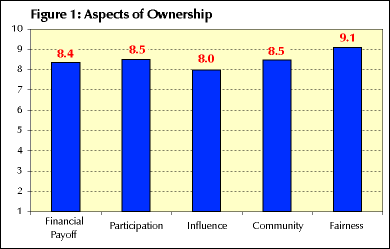31 ian. 2015
moment dâmboviţean
Pare că se crede despre coaching că e un fel de peltea care poate ascunde orice ''ne-am'' în ea. A-ha.
29 ian. 2015
"The conscious organization" - a coaching oriented organization
In a very interesting article published couple of years ago by John Renesch in the Journal of Values-Based Leadership, it is emphasized the need to ’’restore full functionality and consciousness to organizations’’ in order to fulfill the very purpose they sprang from: to serve people and make life easier. Building further on Peter Senges’s theory about learning organization, Renesch proposes a new perspective on companies future development and launch the concept of conscious organization – ’’The conscious organization is a group of people who are constantly examining their individual and collective consciousness. By definition, this makes the conscious organization a work-in-progress.’’ One of the key actions to grow a conscious organization is to welcome steady preoccupation to develop the habit of self-examination into the workplace, and as the human being as well – to live conscious is ‘’a core ideal throughout life’’.
He emphasize the difference between ''conscious'' and ''aware'': conscious is being aware and responsible.
Both awareness and responsibility are core values in coaching.
‘’Having a conscious and healthy relationship with
co-workers and the organization’s mission is of paramount importance.(..)Conscious
organizations are always prepared to rebuke complacency and strive for greater awareness
and responsible action.’’ John Renesch
Great people about Renesch: "Warren Bennis, best-selling American author of leadership books for thirty years, calls John “a wise elder who shines with wisdom.” Stanford University’s School of Business’s Michael Ray calls him “a beacon lighting the way to a new paradigm.”
P.S. I am not an Echart Tolle apostle, but we can elaborate on this saying of him: "You get there by realizing you are already there''...
26 ian. 2015
daca iti vine sa ai succes..
''- Nu înţelegi. Am să fiu extraordinară. Am mai mult p o t e n ţ i a l decât tine.
- Potenţial, am zis, nu înseamnă nimic.Trebuie să o faci. Orice bebeluş are mai mult potenţial decât mine.'' Bukowski, Femei, ed. Polirom
Mdeci, dacă îţi vine să ai succes, dă-ţi voie, domnule! Eeee..
- Potenţial, am zis, nu înseamnă nimic.Trebuie să o faci. Orice bebeluş are mai mult potenţial decât mine.'' Bukowski, Femei, ed. Polirom
Mdeci, dacă îţi vine să ai succes, dă-ţi voie, domnule! Eeee..
Voie înseamnă voinţă, da!?
Despre ''rezistenţa la succes'', aici:
http://coaching2success.blogspot.ro/…/are-people-reluctant-…
Despre cum să antrenezi voinţa, aici:
https://www.linkedin.com/pulse/locus-control-when-me-fly-i-am-wings-magda-bunea?trk=mp-reader-card
Despre NESTworking ca practică cu succes a antrenării, aici: e bine când e bine mai mult!
Despre ''rezistenţa la succes'', aici:
http://coaching2success.blogspot.ro/…/are-people-reluctant-…
Despre cum să antrenezi voinţa, aici:
https://www.linkedin.com/pulse/locus-control-when-me-fly-i-am-wings-magda-bunea?trk=mp-reader-card
Despre NESTworking ca practică cu succes a antrenării, aici: e bine când e bine mai mult!
About ownership in the workplace (1)
’The incentive effect is necessary, but the real power of employee ownership results from the culture effect.’’ (Ownership Culture Reports, published byOwnership Associates, Inc.)
I think this is the key perspective to grow upon this very useful article lead to. Organizational culture is the way people – managers and employees - and environments communicate in the workplace.
Usually,
people associate ‘’employee ownership’’ with owning shares - or, as in the above
cited research, with “investment,” “incentive,” “teamwork,” “bogus,”
“equality,” “a good benefit,” “employee involvement”. Lets acknowledge that wage’s level is
important – Maslow basic needs pyramid -, and as participation to company’s profit
it is thoroughly important to developing a sense of ownership – nobody would
agree ‘’to own an uncomfortable situation’’.

Copyright: http://www.ownershipassociates.com/ocr4.shtm
From the reported data, is interesting to notice that ‘’fairness’’ (to be treated fairly at work) has the highest level against the so perceived more practical dimensions of ownership related to financial aspects. Lets observe that fairness is one of the main values even so called ''bad people'' have – any thief cherishes his fairness toward his bad conduct. Fairness is something we own by default. The fact that it springs on the first place of ''needed conditions for feeling a sense of ownership in the workplace'' is a sign that people are aware of living their very lives in the workplace. And they want to live it properly.
Leaders and managers
are advised to also be aware of that, and to put needed actions in their
strategies to welcome ‘’employee's ownership’’, paying attention to fairness,
incentives, participation: communicate
with honor; elicit involvement at all levels, and celebrate support personnel does
offer; ask what ownership means to people, and ‘’tailor plans’’ to fit their
needs to feel ownership.
Abonați-vă la:
Postări (Atom)






